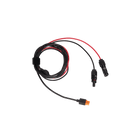What causes power outages?
I Want To Prepare Backup Power For
Hours-Long Outages


1-Day Outages


3-Day Outages


Subscribe for home backup solution updates, news and much more.
Read More About Power Backup
Frequently Asked Questions
What Is the Best Generator for Home Backup Power?
Solar generators are the only safe option for producing electricity inside your house. Gas, diesel, and propane generators emit deadly carbon monoxide and must never be operated indoors. The best solar generator for you depends on your home electricity consumption and how long you want backup power during a blackout.
How Much Does a Generator for a House Cost?
Generators vary in cost based on numerous factors, including fuel type, manufacturer, AC output and storage capacity, and performance. Diesel and other fossil fuel generators emit deadly carbon monoxide and must never be operated indoors. Solar generators and portable power stations provide quiet backup electricity that’s 100% safe for indoor use. Entry-level models typically cost less than ₱10,000.
How Much Backup Power Do I Need for My House?
The right size backup generator for your house depends on numerous factors, including the combined power load of the appliances and systems — like air conditioning — that you want to run simultaneously during a power outage and how long you want to run them before refueling or recharging. Generators that burn fossil fuels like gas or diesel must never be used indoors— you’ll risk serious injury or death. Solar generators and portable power stations are reliable, affordable, and totally safe for indoor use.
How Long Can Solar Batteries Power a House During an Outage?
As long as your solar panels generate more electricity than you consume, solar batteries can power your house indefinitely during a blackout. All renewable energy sources — like solar and wind — are intermittent. Solar panels can’t generate electricity at night. It’s essential to ensure that your solar generator’s battery storage capacity — in watt-hours (Wh) or kilowatt-hours (kWh) — meets your household electricity requirements between charges or in a power outage.
How Long Can You Run a Generator Continuously Indoors?
Generators that burn fossil fuels — like gas, propane, diesel, and inverter generators — can NEVER be operated indoors. Even the most advanced fuel-burning generator produces carbon monoxide — an odorless, invisible gas — that can kill in minutes without ever being detected. Solar generators and backup battery systems like portable power stations are the only home generators that are safe to operate indoors. Depending on the model, they can run for hours, days, or longer with enough solar panels.
Why Are There So Many Power Outages in the Philippines?
Filipinos suffer more blackouts than residents of most other countries. The Luzon, Visayas and Mindanao power grids are under constant strain and are frequently subject to yellow or red alerts — and blackouts. Power outages occur due to aging infrastructure, insufficient electricity supply to meet growing demand, and extreme weather events like typhoons, earthquakes, and floods. Indoor solar generators and battery backup systems are a wise investment in keeping your home and family safe.
What Do I Need to Survive With No Power?
One way to minimize the negative impact of outages is to have a safe secondary power source, like an indoor backup generator with solar panels. Always make sure to have a supply of drinking water, non-perishable foods, flashlights, and first-aid or emergency kits. Don’t depend on your mobile phone to stay informed during extreme weather events and blackouts. Buy a portable battery-operated radio, as transmission will continue even if cellular service and data are unavailable.





















